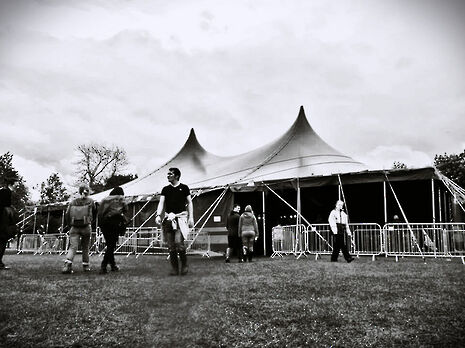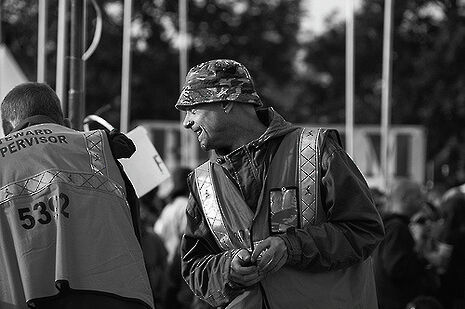My summer festival (work) experience
Working at a music festival could be the perfect answer to shifting your overdraft while beating that long vacation slog

My summer started slow. The May Week carnival had come and gone, and I found myself happy to be back in South London. I hadn’t organised a holiday, let alone an exciting internship. A trip to visit family in Northern Ireland lay exotically off in August. An email came through from my Director of Studies, ambitiously asking me to get “stuck in” to summer reading.
I, however, was lucky enough to get hold of a ticket to Glastonbury. When buying pints between acts, I noticed the number of people my age working at the bar. To me, an unemployed student, the benefits of their job seemed quite plain: they were able to see a huge variety of performances, work with other young people at a busy and lively bar, and get paid for it.
The first thing I did was to find a festival recruitment agency on Google, and create a profile. This was followed by a telephone interview, where I think the interviewer spoke more than I did. Although they certainly don’t just accept anyone, they seemed pretty enthusiastic (read: desperate) about getting as many people signed up as possible.
Once you're accepted, you can immediately start “registering your interest” in various events, from Bestival, Reading and Leeds, to V Festival and British Summer Time in Hyde Park. The best tactic is to get a friend involved too – when you ring to confirm your place, you can ask to work with them. This way, you can piss about after work with a couple of free pints at a Massive Attack gig you didn't even pay for. Or, in their words, “encourage a friendly working environment”.
Transport is often provided free-of-charge to more secluded events, while the work itself usually starts at about 11am and finishes late. However, this is ‘casual’ employment, so you are only guaranteed four hours of work, although I usually worked 10-11 hours in a day.
While this insecurity may be a downside, the pay is around £2 more than minimum wage, and lunch (often a meal ticket for decent festival food) is provided. The motive for working is not, of course, the money, but the festival environment – both the interesting people you meet and the great bands you see make it a better gig than stacking shelves all summer.

The ‘casual’ nature of the work, while having its disadvantages, is one of the main attractions of the job. At the start of the summer, I wasn't sure when I would go on holiday or hang out with friends, but I have been able to pick and choose my dates of employment to earn money while also prioritising friends and sun before the hectic Michaelmas term. The flexibility of the work has allowed me to fit my summer around having fun, rather than fitting my summer around work.
There are opportunities for Cambridge students across the country in Manchester, Suffolk, rural Norfolk, Scotland and more. If you are a Londoner, BST is a great one to start with; it offers six days of employment with names like Stevie Wonder, Florence and the Machine, and Kendrick Lamar right at the start of the long vacation.
Easter term in Cambridge is by far the busiest, so if you miss out on applying for a more permanent role or internship, or if you want a chilled summer but need to save for a holiday, then working at music festivals may just be for you.
 News / Police to stop searching for stolen Fitzwilliam jade17 April 2024
News / Police to stop searching for stolen Fitzwilliam jade17 April 2024 News / Copycat don caught again19 April 2024
News / Copycat don caught again19 April 2024 Interviews / ‘It fills you with a sense of awe’: the year abroad experience17 April 2024
Interviews / ‘It fills you with a sense of awe’: the year abroad experience17 April 2024 News / Night Climbers call for Cambridge to cut ties with Israel in new stunt15 April 2024
News / Night Climbers call for Cambridge to cut ties with Israel in new stunt15 April 2024 News / Acting vice-chancellor paid £234,000 for nine month stint19 April 2024
News / Acting vice-chancellor paid £234,000 for nine month stint19 April 2024




